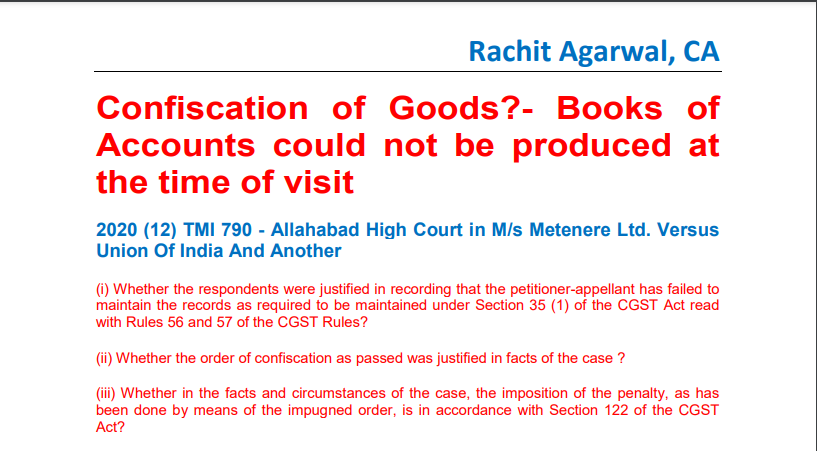Confiscation of Goods?- Books of Accounts could not be produced at the time of visit
2020 (12) TMI 790 – Allahabad High Court in M/s Metenere Ltd. Versus Union Of India And Another
(i) Whether the respondents were justified in recording that the petitioner-appellant has failed to maintain the records as required to be maintained under Section 35 (1) of the CGST Act read with Rules 56 and 57 of the CGST Rules?
(ii) Whether the order of confiscation as passed was justified in the facts of the case?
(iii) Whether in the facts and circumstances of the case, the imposition of the penalty, as has been done by means of the impugned order, is in accordance with Section 122 of the CGST Act?
Facts
1. Department visited the factory premises and passed an order of detention detaining 12,979 metric tonnes of the entire stock
2. Books of the Accounts could not be produced at the time of visit
3. The Goods lying at the factory was confiscated
4. The petitioner was given an option of redeeming the confiscated goods on payment of redemption fine amounting to ₹ 12 crores in terms of the provisions of Section 130 (2) of the Act.
5. In addition to the said a penalty of ₹ 19,43,89,804/- was imposed
6. Further penalty amounting to ₹ 50,000/- was imposed on the Managing Director of the Company under Section 122 (3) of the CGST read with Section 122 (3) of the Uttar Pradesh GST (₹ 25,000/- each under CGST and UP GST Act, 2017).
7. Petitioner herein preferred an appeal against the said order whereby the appeal filed was rejected and the order impugned in the appeal was confirmed.
Petitioner Pleadings
1. The records of GST were not available in the factory premises as the same was kept at the head office of the petitioner situated at Ghazipur.
2. No document showing unaccounted cash was found
3. Allegations levelled were wholly baseless inasmuch as it was throughout the case of the petitioner that all the records were maintained at the principal place of business
4. Documents in the electronic form were stored in the computer, however, the same could not be given to the respondent authorities on their visit as the internet was not functional on the said date
5. There is no allegation or averment with regard to evasion of duty nor has any exercise been conducted by the department to establish and ascertain the duty evaded.
6. Even assuming without admitting the charges levelled against the petitioner the quantum of penalty that could have been imposed for violation of not keeping the documents at the manufacturing premises could not exceed ₹ 10,000/- inasmuch as no exercise for quantifying the “tax evaded”
7. Neither any allegation with regards to the issuance of invoices nor is there any allegation with regard to receiving of the payment.
8. No “reason to believe” which is “sin qua non” for the exercise of powers under Section 66 were ever recorded.
Respondent Pleadings
1. The principal place of business was mentioned at Noida, although, the counsel for the petitioner has filed a registration certificate showing the principal place of business at Delhi,
2. Documents were required to be maintained electronically and the assessee is required to produce the relevant records on being asked to do so and recorded and that the petitioner failed even to produce and submit required accounts
Hon’ble Court Order
(ii) Whether the order of confiscation as passed was justified in the facts of the case?
1. There is no finding to the effect that any supply was made with an intent “to evade payment of tax” as is required under Section(i) of Section 130 (1);
2. There is nothing on record to establish that the petitioner did not account for any goods on which he is liable to pay tax under the Act
3. There is nothing on record to the effect that any supplies were made without having applied for registration
4. It has not been established that there was any contravention of any provision or any Rules with an “intent to evade payment of tax
None of the ingredients which are required for confiscation existed in the present case and thus, the confiscation itself was wholly arbitrary and illegal.
(iii) Whether in the facts and circumstances of the case, the imposition of the penalty, as has been done by means of the impugned order, is in accordance with Section 122 of the CGST Act?
firstly, the only allegations are that the petitioner has not maintained the Book of Accounts as are required under the Act and the Rules, and secondly, the penalty has been imposed holding the Petitioners conduct in violation of Section 122 (1) (xvi) and (xvii) of the CGST Act read with Section 122(1) (xvi) & (xvii) of UP GST Act and thirdly, no exercise for quantification of the tax evaded has been done in pursuance to the powers conferred under Section 35 (6) read with Section 73 or 74 of the Act,
I have no hesitation in holding that in the given facts and circumstances of the case for the violations alleged and established against the Petitioner, the maximum penalty that could be imposed upon the petitioner is ₹ 10,000/-.
(iii) Whether in the facts and circumstances of the case, the imposition of the penalty, as has been done by means of the impugned order, is in accordance with Section 122 of the CGST Act?
The impugned orders dated 15.1.2020 and 27.1.2020 (Annexure No. 5) are set aside insofar as it relates to confiscation of goods and imposition of penalty in excess of ₹ 10,000/-, as the confiscation has been set aside, there is no question of payment of redemption fine.
If you already have a premium membership, Sign In.
 CA Rachit Agarwal
CA Rachit Agarwal













